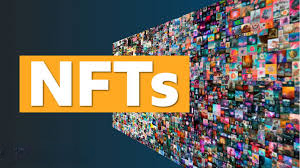How Will Web 3.0 Marketing Evolve in the Coming Years?

Strong 8k brings an ultra-HD IPTV experience to your living room and your pocket.
Web 3.0 marketing is set to revolutionize how brands interact with their audiences by leveraging decentralization, blockchain technology, and artificial intelligence. As this new internet era evolves, marketing strategies will become more personalized, transparent, and community-driven. Brands will benefit from enhanced user control over data, increased trust, and direct engagement via decentralized platforms. In the coming years, marketers must adapt to these changes to stay relevant and effectively connect with the digital-savvy audience of Web 3.0. This blog explores the future of Web 3.0 marketing and its impact on digital campaigns.
What Is Web 3.0 Marketing?
Web 3.0 marketing refers to promotional strategies that leverage the decentralized technologies of the next-generation internet, including blockchain, cryptocurrencies, and decentralized applications (dApps). Unlike traditional marketing, Web 3.0 marketing emphasizes user ownership of data, transparency, and community engagement through tokenization, NFTs, and decentralized platforms. It focuses on building authentic relationships with audiences by empowering users with control and incentivizing participation in ecosystems, enabling brands to connect in more personalized, trust-driven, and interactive ways.
Core Technologies Shaping Web 3.0 Marketing
Web 3.0 marketing is fundamentally driven by a suite of advanced technologies that are transforming how brands connect with their audiences. At the heart of this transformation is blockchain technology, which introduces decentralization and transparency into marketing ecosystems. By leveraging blockchain, marketers can create verifiable and tamper-proof records of transactions, build trust through transparent data sharing, and empower users with ownership over their personal information. This shift away from centralized data control reshapes how customer relationships are managed, fostering greater authenticity and user engagement.
Another critical technology shaping Web 3.0 marketing is artificial intelligence (AI) and machine learning. These technologies enable marketers to analyze vast amounts of decentralized data efficiently and derive actionable insights. AI-driven algorithms help create highly personalized marketing campaigns, predict customer behavior, and automate real-time interactions. In the Web 3.0 context, AI tools work hand-in-hand with blockchain to deliver tailored experiences while respecting user privacy and data sovereignty.
Non-fungible tokens (NFTs) and tokenization are also redefining marketing possibilities. NFTs allow brands to offer unique digital assets that can serve as loyalty rewards, exclusive access tokens, or collectibles, enhancing customer engagement and brand affinity. Tokenization enables innovative incentive models where users can earn tokens for participation, advocacy, or content creation. These tokens can have utility within a brand’s ecosystem or be traded on decentralized platforms, thus opening new revenue streams and marketing avenues that are native to the Web 3.0 environment.
Key Trends in Web 3.0 Marketing Evolution
The evolution of Web 3.0 marketing is marked by several key trends that are reshaping how brands engage with audiences in a decentralized digital landscape. One prominent trend is the rise of decentralized autonomous organizations (DAOs), which enable communities to govern marketing initiatives collectively. This shift democratizes decision-making, fostering greater trust and involvement among users, and encourages collaborative brand-building efforts that feel more authentic and community-driven. Another important trend is the growing integration of immersive technologies like virtual reality (VR) and augmented reality (AR). These technologies allow brands to create engaging, interactive experiences that go beyond traditional advertising. By offering immersive environments and product demonstrations, marketers can deepen customer engagement and build stronger emotional connections in the Web 3.0 space.
Personalization powered by artificial intelligence continues to advance as well. AI-driven tools are becoming more sophisticated in analyzing decentralized data, enabling marketers to tailor campaigns at an individual level while respecting privacy norms. This trend supports highly relevant messaging that resonates with users without compromising their data sovereignty. Additionally, the use of token-based incentive models is gaining momentum. Brands are leveraging cryptocurrencies and NFTs to reward loyal customers, encourage content creation, and stimulate participation in marketing campaigns. These tokenomics-driven approaches create new opportunities for user engagement and brand loyalty, aligning incentives between marketers and consumers.
Impact on Brands and Marketers
The rise of Web 3.0 marketing is significantly transforming how brands and marketers operate in the digital space. For brands, it means shifting from traditional top-down advertising to a more decentralized and community-driven approach. This requires embracing transparency and active engagement with users who now play a bigger role in shaping brand narratives through decentralized platforms and DAOs. As a result, brands must become more authentic and responsive to build lasting trust and loyalty.
Marketers face the challenge and opportunity of leveraging new technologies such as blockchain, AI, and immersive experiences to create personalized and interactive campaigns. These tools allow marketers to deliver highly targeted messaging while respecting user privacy, a crucial factor in today’s data-sensitive environment. Additionally, token-based incentives introduce novel ways to reward engagement and foster deeper connections, encouraging marketers to innovate beyond traditional loyalty programs.
Furthermore, the increased emphasis on data sovereignty and security compels marketers to rethink data collection and usage strategies. They must adapt to evolving regulations and user expectations by adopting privacy-first marketing tactics, which can ultimately strengthen brand reputation. Overall, Web 3.0 demands that brands and marketers become more agile, tech-savvy, and community-focused to thrive in this new era of digital marketing.
Case Studies of Successful Web 3.0 Marketing Campaigns
One standout example of Web 3.0 marketing success is the launch of Decentraland’s virtual real estate campaign. By leveraging blockchain technology and NFTs, Decentraland created a fully immersive virtual world where users could buy, sell, and develop digital land parcels. Their marketing strategy focused heavily on community involvement and user-generated content, encouraging early adopters to participate in shaping the platform’s growth. This approach built a loyal and engaged user base, driving massive awareness and adoption.
Another notable case is Axie Infinity’s play-to-earn model, which revolutionized gaming marketing by integrating tokenomics and blockchain rewards. The campaign emphasized incentivizing players with real economic value through its native tokens, creating a self-sustaining ecosystem. By partnering with influencers and fostering strong community ties, Axie Infinity saw exponential growth and became a pioneer in blockchain gaming marketing.
Uniswap’s decentralized exchange (DEX) marketing also highlights effective Web 3.0 strategies. Their use of liquidity mining rewards combined with transparent governance tokens empowered users to actively participate in platform decisions. This not only boosted liquidity but also turned users into brand advocates, strengthening the platform’s market position.
How to Prepare Your Marketing Strategy for Web 3.0
To effectively prepare your marketing strategy for Web 3.0, begin by understanding the core values of decentralization, user empowerment, and transparency that define this new internet era. Tailor your messaging to emphasize trust and community participation, as users now seek brands that foster genuine connections rather than just selling products. Incorporate blockchain-based tools and technologies, such as NFTs and tokens, to create interactive and rewarding experiences that engage your audience on a deeper level.
Next, focus on building strong, authentic communities across decentralized platforms and social networks. Engage your audience with meaningful content, encourage user-generated contributions, and leverage decentralized social media channels to foster trust and loyalty. Collaborate with key opinion leaders (KOLs) and influencers who resonate with the Web 3.0 ethos to amplify your reach organically.
Finally, integrate analytics and feedback loops that respect user privacy and data ownership. Use decentralized data tools to gain insights without compromising transparency, allowing you to continuously refine your strategy. Staying adaptive and transparent will position your brand for success in the evolving Web 3.0 landscape.
Future Predictions for Web 3.0 Marketing
As Web 3.0 continues to evolve, marketing will become increasingly decentralized, with brands shifting power to users and communities. Personalized experiences powered by artificial intelligence and blockchain data will enable hyper-targeted campaigns while maintaining user privacy and control over data. Token-based incentives and NFT rewards will become standard tools to boost engagement, loyalty, and user participation.
Moreover, immersive technologies like virtual and augmented reality will merge with Web 3.0 platforms, creating interactive marketing environments where consumers can experience products and services firsthand. Brands will also adopt decentralized autonomous organizations (DAOs) to involve communities in decision-making and governance, fostering deeper trust and collaboration.
Finally, transparency and ethical marketing practices will rise in importance as consumers demand more accountability from brands. Marketers who embrace these shifts early will gain a competitive edge in building authentic, lasting relationships in the Web 3.0 era.
Conclusion
The evolution of Web 3.0 marketing promises to transform the digital landscape by fostering transparency, personalization, and community empowerment. As decentralization gains momentum, brands will need to rethink traditional marketing approaches and embrace blockchain-powered tools, AI-driven insights, and token-based incentives to engage users meaningfully. Staying ahead in this dynamic environment will require marketers to innovate continuously, adapt to new technologies, and build authentic relationships with their audience. The future of marketing is decentralized, collaborative, and user-centric a true reflection of Web 3.0’s potential.
Note: IndiBlogHub features both user-submitted and editorial content. We do not verify third-party contributions. Read our Disclaimer and Privacy Policyfor details.







